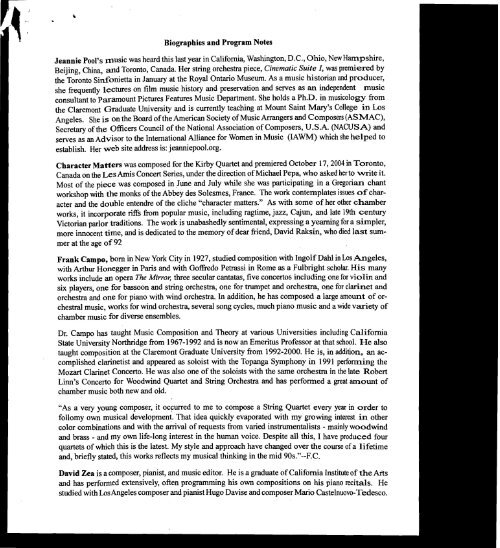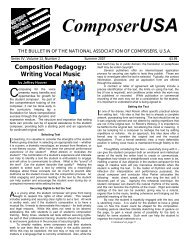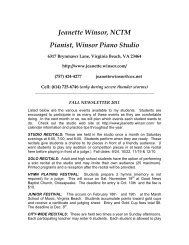1999-2007 - Music-USA.org
1999-2007 - Music-USA.org
1999-2007 - Music-USA.org
You also want an ePaper? Increase the reach of your titles
YUMPU automatically turns print PDFs into web optimized ePapers that Google loves.
Biographies and Program Notes<br />
Jeannie Pool's music was heard this last year in California, Washington, D.C., Ohio, New Hampshire,<br />
Beijing, China, and Toronto, Canada. Her string orchestra piece, Cinematic Suite I, was premiered by<br />
the Toronto Sinfonietta in January at the Royal Ontario Museum. As a music historian and producer,<br />
she frequently lectures on film music history and preservation and serves as an independent music<br />
consultant to Paramount Pictures Features <strong>Music</strong> Department. She holds a Ph.D. in musicology from<br />
the Claremont Graduate University and is currently teaching at Mount Saint Mary's College in Los<br />
Angeles. She is on the Board of the American Society of <strong>Music</strong> Arrangers and Composers (ASMAC),<br />
Secretary ofthe Officers Council of the National Association of Composers, U.S.A. (NAC<strong>USA</strong>) and<br />
serves as an Advisor to the International Alliance for Women in <strong>Music</strong> (IAWM) which she helped to<br />
establish. Her web site address is: jeanniepool.<strong>org</strong>.<br />
Character ~~tters'was composed for the Kirby Quartet and premiered October 17,2004 in Toronto,<br />
Canada on the Les Arnis Concert Series, under the direction of Michael Pepa, who asked her to write it.<br />
Most of fie piece was composed in June and July while she was participating in a Gregorian chant<br />
workshop with the monks of the Abbey des Solesmes, France. The work contemplates issues of character<br />
and fie double entendre of the cliche "character matters." As with some of her other chamber<br />
works, it incorporate riffs from popular music, including ragtime, jazz, Cajun, and late 19th century<br />
Victorian parlor traditions. The work is unabashedly sentimental, expressing a yearning for a simpler,<br />
more innocent time, and is dedicated to the memory of dear friend, David Raksin, who died last surnmer<br />
at the age of 92<br />
Frank Campo, born in New York City in 1927, studied composition with Ingolf Dahl in Los Angeles,<br />
with Arthur Honegger in Paris and with Gofiedo Petrassi in Rome as a Fulbright scholar. His many<br />
works include an opera The Mirror, three secular cantatas, five concertos including one for violin and<br />
six players, one for bassoon and string orchestra, one for trumpet and orchestra, one for clarinet and<br />
orchestra and one for piano with wind orchestra. In addition, he has composed a large amount of or-<br />
chestral music, works for wind orchestra, several song cycles, much piano music and a wide variety of<br />
chamber music for diverse ensembles.<br />
Dr. Campo has taught <strong>Music</strong> Composition and Theory at various Universities including California<br />
State University Northridge from 1967-1 992 and is now an Emeritus Professor at that school. He also<br />
taught composition at the Claremont Graduate University from 1992-2000. He is, in addition, an ac-<br />
complished clarinetist and appeared as soloist with the Topanga Symphony in 1991 performing the<br />
Mozart Clarinet Concerto. He was also one of the soloists with the same orchestra in the late Robert<br />
L~M's Concerto for Woodwind Quartet and String Orchestra and has performed a great amount of<br />
chamber music both new and old.<br />
"As a very young composer, it occurred to me to compose a String Quartet every year in order to<br />
follomy own musical development. That idea quickly evaporated with my growing interest in other<br />
color combinations and with the &val of requests from varied instrumentalists - mainly woodwind<br />
and brass - and my own life-long interest in the human voice. Despite all this, I have produced four<br />
quartets of which this is the latest. My style and approach have changed over the course of a lifetime<br />
and, briefly stated, this works reflects my musical thinking in the mid 90s."--F.C.<br />
David Zea is a composer, pianist, and music editor. He is a graduate of California Institute of the Ms<br />
and has performed extensively, often programming his own compositions on his piano recitals. He<br />
studied with Los Angeles composer and pianist Hugo Davise and composer Mario Castelnuovo-Tedesco.




